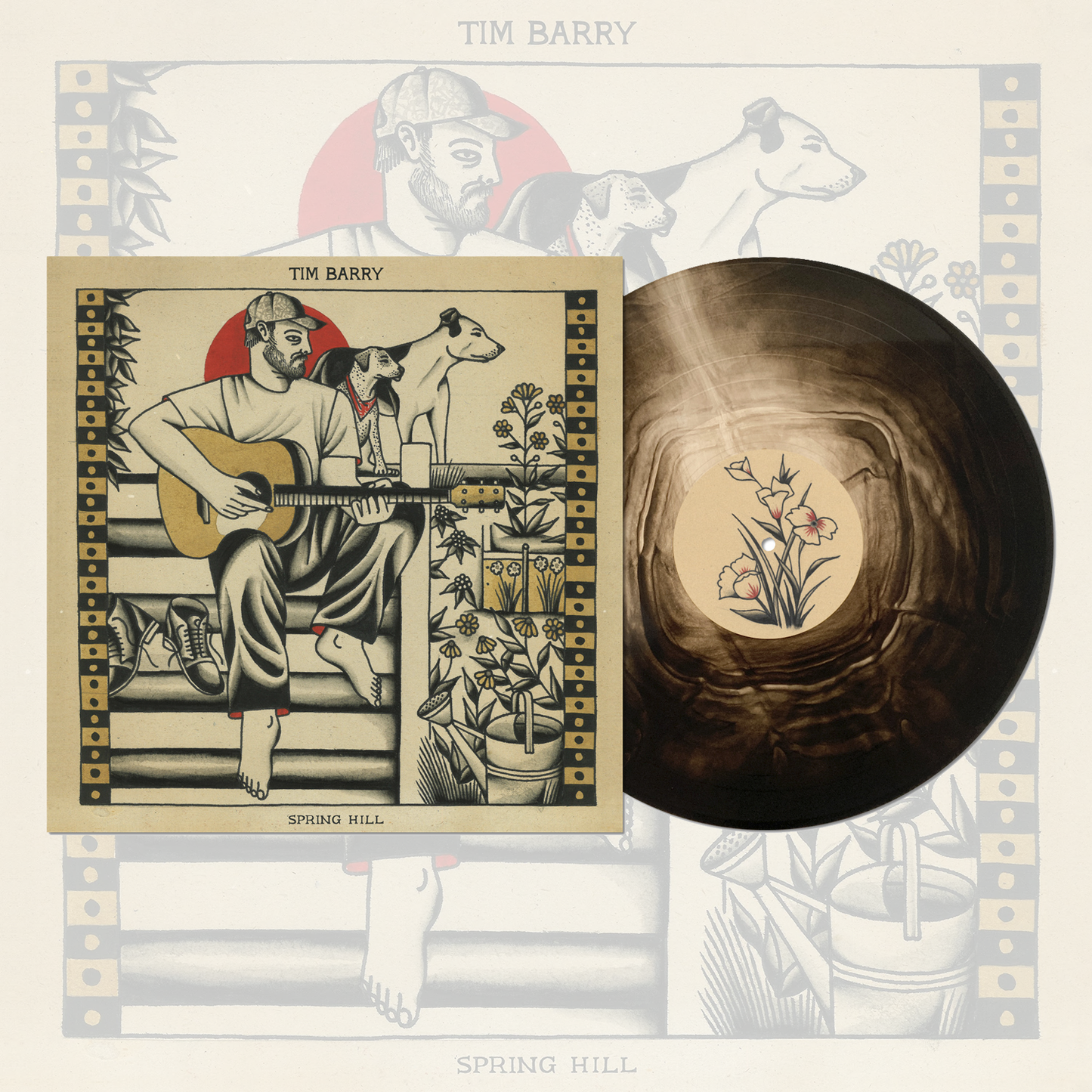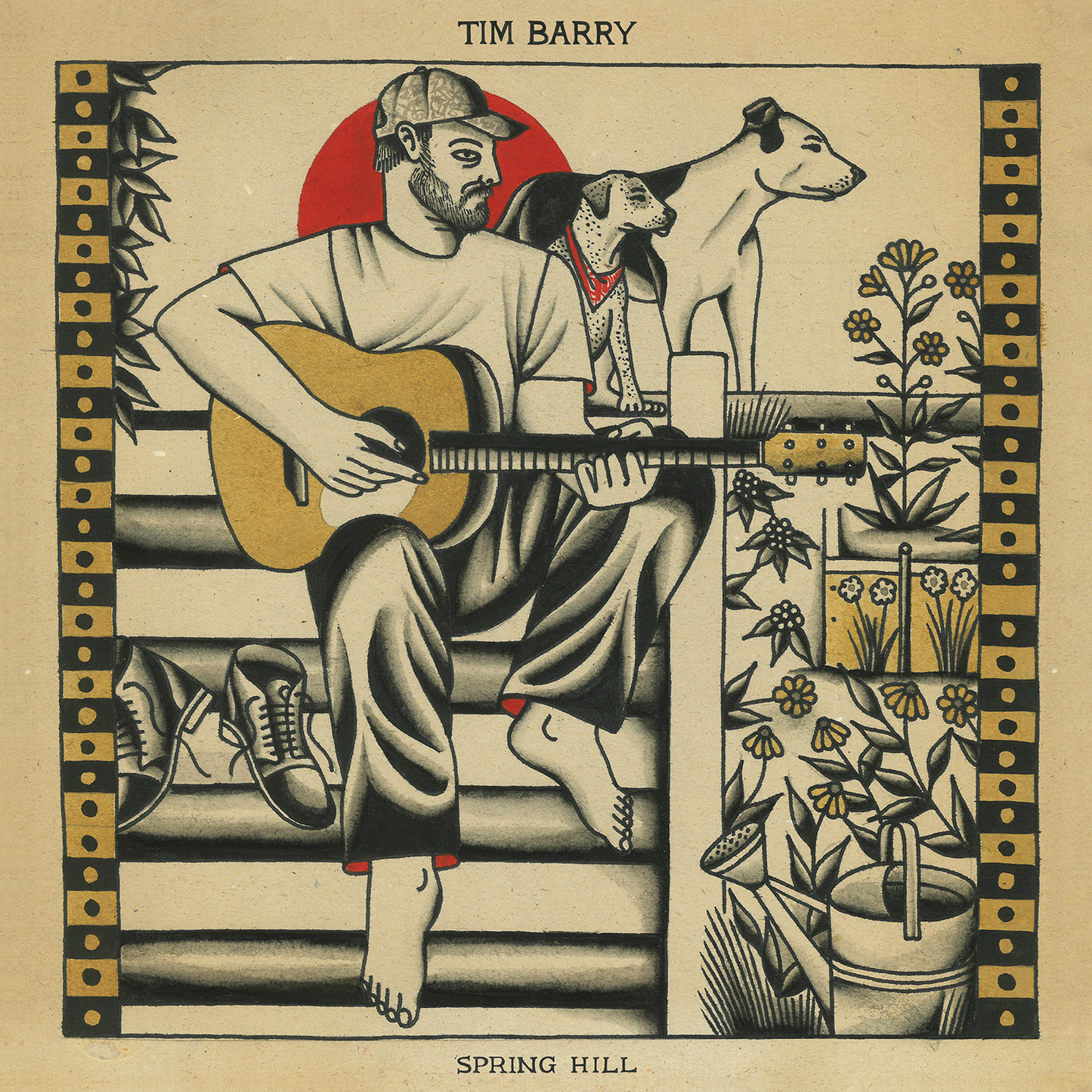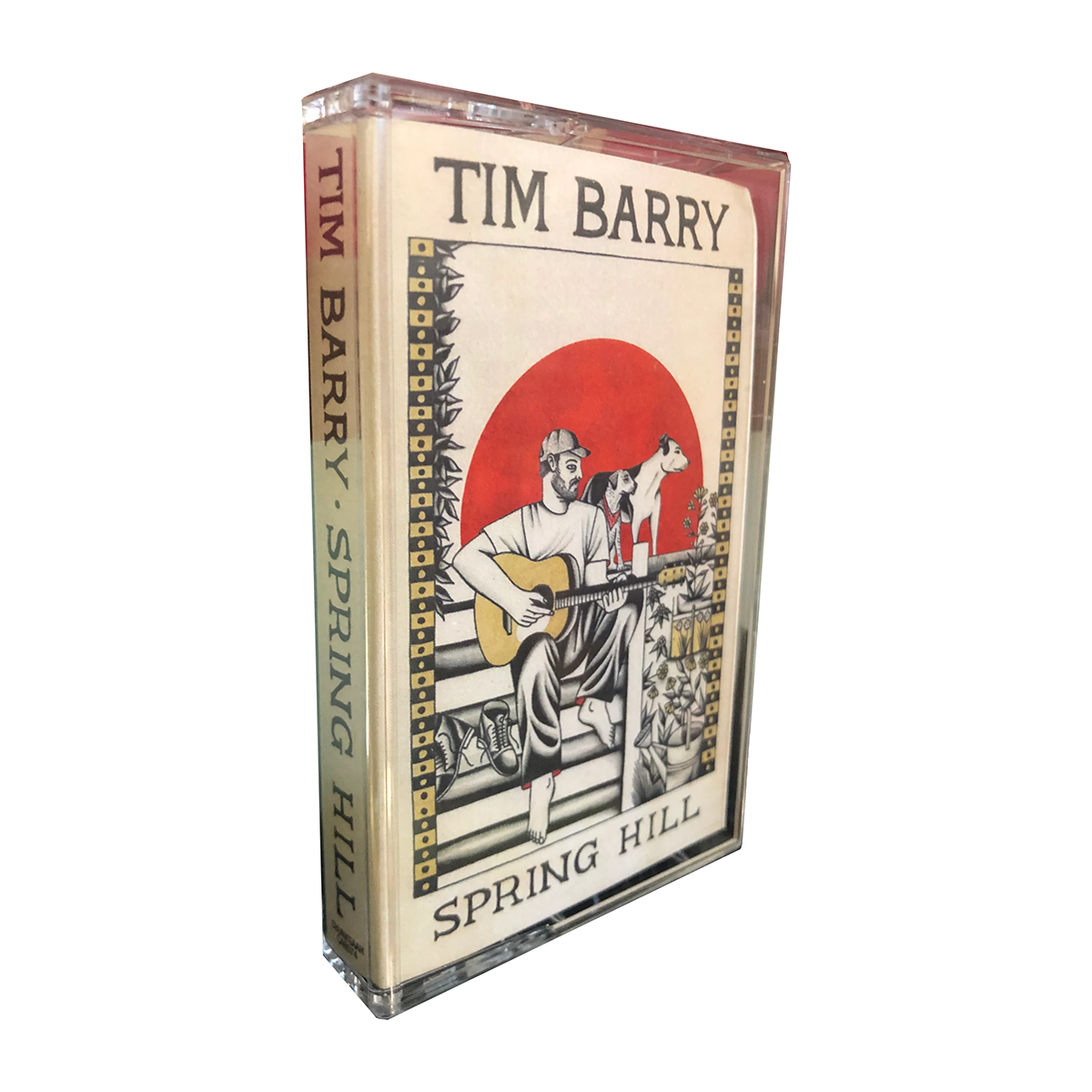Tim Barry
Tim Barry "Spring Hill" LP/Cassette (Beer/Black "Galaxy" Vinyl)
Regular price
$20.00 USD
Regular price
Sale price
$20.00 USD
Unit price
per
Couldn't load pickup availability
"Spring Hill" LP / Cassette
Vinyl Color - Beer/Black "Galaxy"
1. Ain't Much for Talking
2. Free as the Wild
3. Glorious
4. Cab 13
5. Grace
6. Swann Street
7. Bella & Charlie
8. Dad's iPad
9. Camille
10. The Breeze
11. Cherry Isle
12. Corner Store
13. Switch Key
*********
And so begins "Ain't Much For Talking," the opening salvo on Tim Barry's latest album, Spring Hill. In a fashion that can only be called "perfectly Tim Barry," the line carries with it some rather immense weight and rather eloquently and succinctly sets the table for what's in store, both on the remainder of the song and on the album as a whole. If you're expecting a baker's dozen tales of introspection and honest reflection and occasional pointed-tongued humor and a handful of lines that'll punch you right square in the solar plexus, you've come to the right place.
It's been just about three years since Barry's last studio album, The Roads To Richmond, a span that pretty nearly matches the longest break between albums in a solo career that's now closer to the end of its second decade than it is to its start. And while it's fair to say that the years since The Roads To Richmond have seen the world-at-large continue to unravel in ways that are as varied as they are tumultuous, much of that turmoil is absent from Spring Hill. Instead, what follows, both on the remainder of "Ain't Much For Talking" and on Spring Hill as a whole, as a real and thorough examination of where Tim's been, a little of where he's headed, and perhaps most importantly, where all of the many hard-earned miles on the above-mentioned tires have brought him to right now.
Which is to say, Richmond. Since the early Avail days three decades ago, it's been no secret that Barry is well-known for being a proud native son of the River City. References to the city and its neighborhoods and its history and its cast of characters have abounded for years, and that's no different on Spring Hill. During the course of the last year, with most options for touring and live music mostly off the table, Barry returned to the familiar Richmond confines of Minimum Wage Recording, alongside his trusted producer-in-arms Lance Koehler. While that's been the modus operandi since the days of Barry's genre-defining debut full length, Rivanna Junction, in 2006, that's not to say that he's returned to the same well time and time again.
Through the process of recording the songs that would become Spring Hill, Barry surrounded himself with a cast of Richmond characters to help fill out a sonic palette that ranges from sparse to haunting to dynamic, sometimes all in the same song. Tim's sister Caitlin Barry once again lends her violin playing talents, joined by the virtuosic harmonica stylings of Andrew Alli. Josh Bearman chimes in on mandolin and banjo. The multitalented Charles Arthur adds pedal steel and lap steel and resonator. Barry himself has added newfound banjo strumming chops to his signature vocal and guitar styles.
The result is a Tim Barry record that's comfortable in its own skin and also willing to explore some new and different levels. Recurring themes of freedom and of moving on abound. Barry long-ago perfected the craft of the "tell off" song, steadfast in his vision and eschewing the trappings and vanities of things like wealth and celebrity in favor of a truer, more real and fulfilled life. That is very much on display in "Free As The Wind" which extols the virtue of enjoying the real, human experiences of a "sunset with no filter, no trophy fish, no fake ass fucking smile." "Bella + Charlie" finds Barry and the brilliant Sally Rose Monnes vocally harmonizing raw, gut-punch lines like "Life didn't start when we met; life didn't end when you left" over a sparse banjo and slide guitar duet.
Then of course there's a bit of lamenting past struggles and hardships and anxieties. "Ain't Much For Talking," sees Barry acknowledging that "The trail lost me once or twice, but ain't never got me down." Over a bed of mostly electric guitar, "Cab #13" finds Barry reflecting on having "wasted so much time in life sick with symptoms fictionalized…boy they don't exist." "Grace" and "The Breeze" touch on similar themes of keeping moving, not sitting still, and living a real and purposeful life after some adversity. "The wheels keep spinning and the wind blows either way."
"Dad's iPad" is a tongue-in-cheek up-tempo knee slapper of a song about movement, albeit of a different kind, lamenting the ways that technology and certain media outlets have poisoned the proverbial well, particularly for older generations. "Corner Store" fits like an old glove, a front-porch boot-stomper about running and drinking and living in - and for - some of life's better moments. "Cherry Isle" has one of the more unique sounds in the TIm Barry oeuvre, a dirty, gritty field holler of a song set over an uptempo, distorted lead banjo. Barry also covers the often overlooked DC band Three's "Swann Street" in a manner that is generally true to the source material and yet somehow quintessentially Tim Barry, particularly how he digs in on lines like "sometimes I feel like I'm living with a stranger / walking by myself."
"Switch Key" brings Spring Hill to a close in a way that serves as a sonic metaphor for the perhaps more comfortable in his own skin situation Barry finds himself in circa 2022. The song starts simply enough, Barry's vulnerable, solitary voice accompanied only by an acoustic guitar. Gradually, the song fills out with simple percussion and Sally Rose Monnes' haunting harmonies. Eventually, a single, distorted guitar reigns, doing its best to muddy things up as the lyrics speak of weathering the storm. Eventually, we resolve melodically, beautifully, a simply strummed mandolin playing us to a close, the calm right end of a bell curve of years and miles and life choices that could have ended far differently.
*********
Vinyl Color - Beer/Black "Galaxy"
1. Ain't Much for Talking
2. Free as the Wild
3. Glorious
4. Cab 13
5. Grace
6. Swann Street
7. Bella & Charlie
8. Dad's iPad
9. Camille
10. The Breeze
11. Cherry Isle
12. Corner Store
13. Switch Key
*********
And so begins "Ain't Much For Talking," the opening salvo on Tim Barry's latest album, Spring Hill. In a fashion that can only be called "perfectly Tim Barry," the line carries with it some rather immense weight and rather eloquently and succinctly sets the table for what's in store, both on the remainder of the song and on the album as a whole. If you're expecting a baker's dozen tales of introspection and honest reflection and occasional pointed-tongued humor and a handful of lines that'll punch you right square in the solar plexus, you've come to the right place.
It's been just about three years since Barry's last studio album, The Roads To Richmond, a span that pretty nearly matches the longest break between albums in a solo career that's now closer to the end of its second decade than it is to its start. And while it's fair to say that the years since The Roads To Richmond have seen the world-at-large continue to unravel in ways that are as varied as they are tumultuous, much of that turmoil is absent from Spring Hill. Instead, what follows, both on the remainder of "Ain't Much For Talking" and on Spring Hill as a whole, as a real and thorough examination of where Tim's been, a little of where he's headed, and perhaps most importantly, where all of the many hard-earned miles on the above-mentioned tires have brought him to right now.
Which is to say, Richmond. Since the early Avail days three decades ago, it's been no secret that Barry is well-known for being a proud native son of the River City. References to the city and its neighborhoods and its history and its cast of characters have abounded for years, and that's no different on Spring Hill. During the course of the last year, with most options for touring and live music mostly off the table, Barry returned to the familiar Richmond confines of Minimum Wage Recording, alongside his trusted producer-in-arms Lance Koehler. While that's been the modus operandi since the days of Barry's genre-defining debut full length, Rivanna Junction, in 2006, that's not to say that he's returned to the same well time and time again.
Through the process of recording the songs that would become Spring Hill, Barry surrounded himself with a cast of Richmond characters to help fill out a sonic palette that ranges from sparse to haunting to dynamic, sometimes all in the same song. Tim's sister Caitlin Barry once again lends her violin playing talents, joined by the virtuosic harmonica stylings of Andrew Alli. Josh Bearman chimes in on mandolin and banjo. The multitalented Charles Arthur adds pedal steel and lap steel and resonator. Barry himself has added newfound banjo strumming chops to his signature vocal and guitar styles.
The result is a Tim Barry record that's comfortable in its own skin and also willing to explore some new and different levels. Recurring themes of freedom and of moving on abound. Barry long-ago perfected the craft of the "tell off" song, steadfast in his vision and eschewing the trappings and vanities of things like wealth and celebrity in favor of a truer, more real and fulfilled life. That is very much on display in "Free As The Wind" which extols the virtue of enjoying the real, human experiences of a "sunset with no filter, no trophy fish, no fake ass fucking smile." "Bella + Charlie" finds Barry and the brilliant Sally Rose Monnes vocally harmonizing raw, gut-punch lines like "Life didn't start when we met; life didn't end when you left" over a sparse banjo and slide guitar duet.
Then of course there's a bit of lamenting past struggles and hardships and anxieties. "Ain't Much For Talking," sees Barry acknowledging that "The trail lost me once or twice, but ain't never got me down." Over a bed of mostly electric guitar, "Cab #13" finds Barry reflecting on having "wasted so much time in life sick with symptoms fictionalized…boy they don't exist." "Grace" and "The Breeze" touch on similar themes of keeping moving, not sitting still, and living a real and purposeful life after some adversity. "The wheels keep spinning and the wind blows either way."
"Dad's iPad" is a tongue-in-cheek up-tempo knee slapper of a song about movement, albeit of a different kind, lamenting the ways that technology and certain media outlets have poisoned the proverbial well, particularly for older generations. "Corner Store" fits like an old glove, a front-porch boot-stomper about running and drinking and living in - and for - some of life's better moments. "Cherry Isle" has one of the more unique sounds in the TIm Barry oeuvre, a dirty, gritty field holler of a song set over an uptempo, distorted lead banjo. Barry also covers the often overlooked DC band Three's "Swann Street" in a manner that is generally true to the source material and yet somehow quintessentially Tim Barry, particularly how he digs in on lines like "sometimes I feel like I'm living with a stranger / walking by myself."
"Switch Key" brings Spring Hill to a close in a way that serves as a sonic metaphor for the perhaps more comfortable in his own skin situation Barry finds himself in circa 2022. The song starts simply enough, Barry's vulnerable, solitary voice accompanied only by an acoustic guitar. Gradually, the song fills out with simple percussion and Sally Rose Monnes' haunting harmonies. Eventually, a single, distorted guitar reigns, doing its best to muddy things up as the lyrics speak of weathering the storm. Eventually, we resolve melodically, beautifully, a simply strummed mandolin playing us to a close, the calm right end of a bell curve of years and miles and life choices that could have ended far differently.
*********
Share






